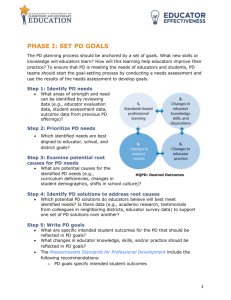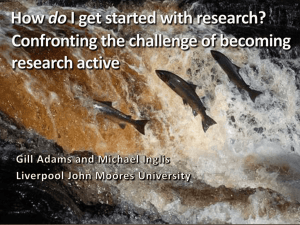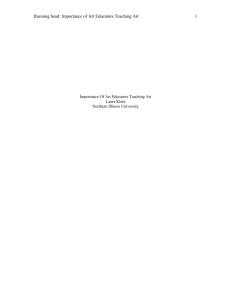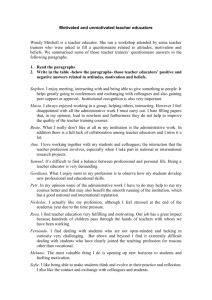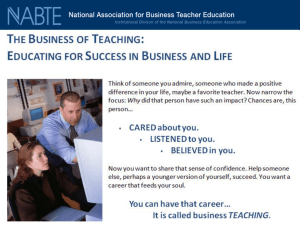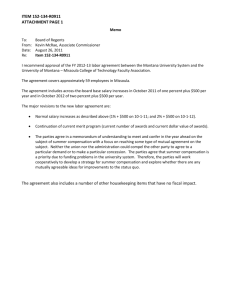Pulaski Professional Growth System - April 24, 2013 ()
advertisement
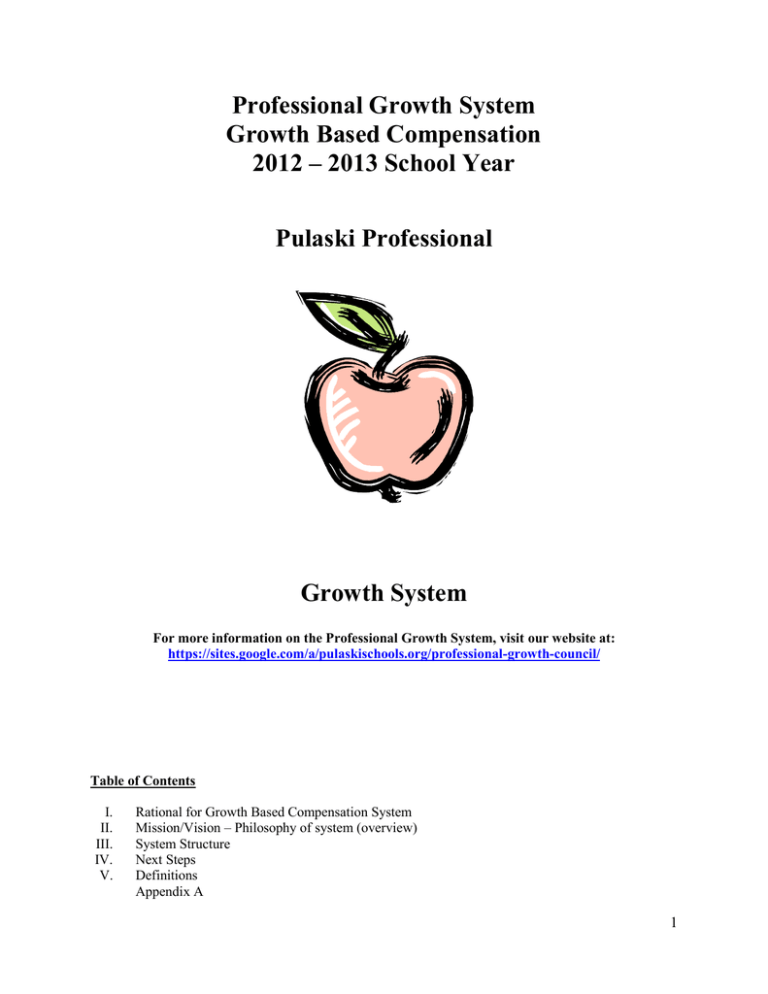
Professional Growth System Growth Based Compensation 2012 – 2013 School Year Pulaski Professional Growth System For more information on the Professional Growth System, visit our website at: https://sites.google.com/a/pulaskischools.org/professional-growth-council/ Table of Contents I. II. III. IV. V. Rational for Growth Based Compensation System Mission/Vision – Philosophy of system (overview) System Structure Next Steps Definitions Appendix A 1 I. Rationale for Growth Based Compensation System We, the Pulaski Community School District, believe that all performance can be improved with, as Carol Dweck describes, a growth mindset, where abilities can be developed through dedication and hard work. The Growth Based Compensation System (GBCS) will help drive improvement in individual and organizational growth while giving new opportunities and using compensation as a catalyst for professional growth. The Pulaski Community School District will continue to build as a learning organization by further developing its current Professional Growth System to move educators’ learning forward. The GBCS will help to tie a results-only work environment (ROWE) with professional plans for accountability in learning and growing. Improved plans are good for individuals, but improved performance is good for the system. The process of the GBCs will follow the process of learning, be highly collaborative in nature, and show transparent growth by all who have a growth mindset. II. Mission/Vision – Philosophy of system (overview) Professional growth is a hallmark of any successful organization. The Pulaski Community School District is committed to the continual professional and personal growth of its staff. We offer a multi-prong approach to Professional Learning which is flexible and models best practices and system mindset of support flows freely throughout the school year to foster growth within and throughout individuals. We look to building community through the strength basedapproach of assessing an individual’s knowledge, skills, and attitudes about optimal learning environments for the 21st Century Learner. The focus is on the implementation of new knowledge and skills using the philosophy of the Results-Only Work Environment to move innovative ideas forward within education. We do what is best for the individual learner while celebrating excellence! 5 Strands of the Professional Growth System 1. Flexible – Teacher Designed Projects 2. Best Practice/Technology 3. System Mindset and Support – Build Community 4. Personal and Professional Balance 5. Supports District, State, and National Expectations III. System Structure System Mindset A system mindset of support flows freely throughout the school year to foster growth within and throughout individuals. Some time will be available during the school year to continually reflect, records, update and reassess one’s Professional Growth Plan. Individual Flexible Blueprint – Professional Growth Plan(s) The Professional Growth Plan(s) (PGP) will be a hybrid between Pulaski’s current system, My Learning Plan, and the state model DPI-34, Professional Development Plan. The PGP will be a living and breathing document which will, and can be, updated, 2 recorded, and reflected on regularly. There will be flexibility within these plans which could consist of the current year, or it may encompass multiple years, which will allow for a continual plan to be prepared and carried out. Components of the “4 Part System” will be included within the Individual Flexible Blueprint to help guide professional growth. The document can eventually turn into a teacher’s portfolio of assessed work and it will be able to show growth over time, compared to a snapshot of learning. The document system will have the capability of aggregating data related to goals so that opportunities are made available to meet the needs of all individuals. Additionally, administrators will have the ability to provide directed goals to staff as needed. Administrative input and discussions will help mold these plans into a successful action process. The Professional Growth Council will identify essential characteristics of a quality professional educator based on Wisconsin’s 10 Teacher Standards, the Danielson Model, and “The Pulaski Way”/District’s Mission and Vision. These characteristics will help guide each individual’s plan within the 4 Part Professional Growth System. 3 Part System The Pulaski Community School District recognizes the efforts of its staff to continually learn and grow as professionals. To this end, the following compensation and growth system will be put in place to encourage not only excellence in teaching and learning but also continuous growth and development as professional educators. This system will support and enhance each educator’s Individual Flexible Blueprint – Professional Growth Plan. The Professional Growth Council and Administrative Team have developed the following system to compensate staff in a growth based system. Given funding approved by the Board of Education, the following compensation will be available: Quality of Service: 50% of the available funding will be used to provide salary increases for the vast majority of teaching staff who are providing quality service to the school community. This includes being well prepared and organized, engaging students, having a positive attitude, showing a commitment to professional growth, being professional in all interactions, being innovative, and striving to move the organization forward. One half of one percent of an educator’s current base plus a fixed dollar amount will make up the salary increase. This compensation, combined with one half of the earnings from other “bonus” compensations listed below (items 2-4), will accumulate and be considered a new base salary for the educator for the following year, o Given what we know now relative to funding for the 2012-2013 school year: $390 + .005 of current base salary will be the quality of service increase at the completion of the 12-13 school year. For example, a teacher whose current base salary is $50,000 and is a quality educator would receive $390 plus $250 for a total of $640 payment for quality service. This is added to the teacher’s current based salary for the purpose of calculating the based salary going forward. 3 Keeping with the district philosophy and to ensure that our students are provided the best quality education, professional staff who have performance or growth related concerns will receive no salary increase and will be placed on an accelerated growth plan. In an effort to ensure objectivity, those who are denied a pay raise based on quality of service will be afforded the opportunity to meet with someone from central office to discuss the determination of educator’s quality of service. Characteristics of a Quality Educator: Ineffective Students feel emotionally vulnerable, hot-tempered, disinterested in students Disorganized, disconnected instruction and assessment, ineffective adjustment to lessons, lack of reflection Disengaged during the lesson, avoids interaction with students, lacks initiative Static learning environment, limited teaching/learning styles, traditional practice Negative attitude toward students, parents, peers, or school, unprofessional comments, degrading/belittling behaviors, not a team player Avoids communication and collaboration with stakeholders. Puts self before concerns of students. Educators rate minimal or basic in the 10 standards and are not making gains to show growth in standards. Characteristic Emotional Environment Skill Effective Cares about students as individual people, patient. Organized, prepared, effective planning, execution, assessment, and reflection. Personally motivated to grow Motivation professionally and keep up with trends in their field. Variety of lessons, hands-on Engagement learning experiences, research based practices Positive attitude, part of the solution, involved in decision making and problem solving, Attitude professional remarks and behaviors, collaborative team member Communicate regularly with colleagues, parents, Communication administrators, and students in an effective manner in the best interest of students. Educators rate proficient, advance, or are making Wisconsin Educator Standards significant gains in each of the 10 standards. 4 Extension of Learning: One half of the compensation awarded in this area will be added to a teacher’s base salary. Red Raider Learning Academy: Week long, 35 hour learning experiences hosted by PCSD and facilitated by PCSD staff. These week-long experiences include two, two hour reflection learning reunions and data collection/program evaluation. o Staff earn $500 for participation in the complete RRLA. o Summer 2012 Sessions: June 11-15, June 18-22, June 25-29, July 23-27, July 30 – August 3, and August 6-10 o Reflection Learning Reunions: 6 sessions offered – staff must choose 2. November/December – 3 offered; choose 1 February/March – 3 offered; choose 1 o Data Collection/Program Evaluation: April/May Pulaski Endorsed Professional Growth Units: All district endorsed opportunities will be focused around elements of Pulaski’s best practice core for development or the district’s yearly focus. PGUs will continue to run as usual. o Catalog of offerings will be developed in August of each year. The offerings will reflect needs and interests of educators as developed at the Red Raider Learning Academy, to support district initiatives, and to address current educational topics of interest. o Included in the catalog will be guidelines regarding how many extension of learning activities participants will be compensated for. Set-up of a learning environment. There will be opportunities for educators to come together as a learning community to collaborate and set-up their own learning environments for the year. There will be 6 hour workshops (2 evenings/3 hours each) setup by the district to help foster research based methods of collaborative learning for what is best for each situation. These sessions will include developing participant’s professional growth plan and sharing and developing a plan for collaborative learning experiences (CLE). An example of the learning plan can be seen in Appendix A. o Participants have been accumulating PGUs for activities in previous years. For the first year of the system (2012-2013) only participants will be able to include PGUs taking in previous years in their CLE plan and may be compensated for these up to the limit communicated in August of 2012 based on available funding. o Pursuing a Master’s Degree/In a program/seeking certification: There will not be an automatic process of approval for graduate or certification degree programs, instead, there will be an approval process which will be developed by the Professional Growth Council and Administration. These programs/credits will need to be growth focused and there will be a dollar amount assigned time invested in results impacting PCSD. Remaining funding will be used to compensate educators who extend their learning through various aspects of the professional growth system. Each professional growth opportunity through the district will be assigned a time/dollar/PGU value. This value will be approximately $10 per hour of work or study toward professional growth. o Given the funding available, the Professional Growth Council estimates that the compensation will be available for 40 hours of Extension of Learning. The 5 compensation for these activities will be paid at the completion of the CLE reflection which is due May 15th. Facilitators will receive either hourly pay of $13 for each hour of facilitation or PGU’s which will be included in the calculation for Extension of Learning and one half added to the base salary for the following school year. Professional Growth Innovation Grants: Twenty-five grants in the amount of $750 will be awarded each year. The grant process is designed to be collaborative and not competitive. As such, grants will be evaluated by administrative members of the Professional Growth Council. Professional staff will create stretch goals to take their craft to the next level by investing time and energy into researching, initiating, developing, and sharing an innovative learning experience. This process will follow the ROWE philosophy. ROWE - Results Only Work Environment provides an opportunity for educators to grow as professionals while contributing to the profession and district. o Some examples of innovation directly linked to classrooms include, but are not limited to: integrated planning and lesson design, piloting new programs or pedagogy, technology innovation and integration, school forest development, supporting those who are willing to change and do something differently, etc. o Examples of innovation reaching out to the greater district-community include, but are not limited to: development of a community garden, initiating parent activities, development of after-school library programs, facilitating evening study sessions, creation of a Parent University, planning of a community venue, research of viability of a community skate park, research of downtown redevelopment, etc. o Innovation Coaches – Grant: Educators who are interested in coaching peers by guiding others through the innovation process and sharing innovation may apply for an innovation grant as an innovation coach. These coaches will develop an Innovation Guide, frame discussions, and be directly involved in each step of the innovation process. All educators who have been awarded grants will participate in continual growth updates through collaborative online learning (blogs, Google Sites, Twitter, etc.) Also, there will be an Annual Professional Learning Fair which is Pulaski’s own education conference during the May in-service day. The day may include a keynote speaker, breakout sessions by Innovation Coaches, innovation booths hosted by Innovation Grant Recipients, TED talks, and unconferences. The Innovation Grant Recipients work will be archived each year for review of process and serve as a foundation of local research for innovation. IV. Next Steps: To institute this system, clerical revisions will be made to the existing professional growth system through MyLearningPlan. Consideration will be given to the scope and specificity of the goals (SMART), action plans, reporting/professional sharing, and administrative review of growth. The co-chairs are in the process of developing a process for educators to seek approval of Master’s programs, certification programs, or graduate credits as well as the procedures surrounding Innovation Grants. A specific process will be outlined for the Innovation Grants 6 identifying steps to apply for the grant, recipient determination, evaluation of the process and results, and expectations for sharing information. The co-chairs are also working in partnership with UW-Green bay toward approval of the Red Raider Learning Academy for 3 graduate credits with credits to be paid for by the staff member. Additionally, we will continue to monitor the development of the state educator effectiveness system. V. Definitions Accelerated Growth Plan: An Accelerated Growth Plan is an action plan designed to address unsatisfactory performance or lack of growth. Annual Professional Learning Fair: The Annual Professional Learning Fair (APLF) will showcase the work of grant recipients, innovation coaches, and those who have extended their learning. As a condition of the grant, recipients must present in some format at the APLF. Best Practice – Core (K12) and Choice: Best Practice will include researched based, current, essential topics necessary to ensure that our educators have a solid foundation to provide quality service. Educator’s Contractual Salary: Educator’s Contractual Salary is the amount that appears on an individual teaching contract. For the following year, this will include the amount earned for Quality of Service as well as half of amounts earned in the extension of learning and compensation grants. Growth Mindset: In a growth mindset, people believe that their most basic abilities can be developed through dedication and hard work –brains and talent are just the starting point. This view creates a love of learning and a resilience that is essential for great accomplishment. (http://mindsetonline.com/whatisit/about/index.html) Innovation Coach: Innovation coaches work directly with educators who are recipients of Innovation Grants and the larger educational community to enhance the learning process and share innovation. These coaches are compensated both monetarily and through release time which will allow Coaches to work directly with other educators in implementation of innovative experiences. Learning Communities: Learning Communities are made up of individuals with a common goal of developing their professional craft by growing and learning with and from one another in a learning environment. Growth Based Compensation System: The Growth Based Compensation System recognizes the contributions of individuals to the organization as well as their efforts to grow as professional educators and the results shown in their daily work. Personal and Professional Balance: Personal and Professional Balance recognized that educators have lives outside of their professional responsibilities and must seek harmony to ensure whole-person well-being. 7 Professional Growth Council: The Professional Growth Council is a committee made up of educators representing the diversity of our professional staff. The Council is responsible for maintaining the Professional Growth System, facilitating its components, evaluation of the system. Professional Growth Plan: The Professional Growth Plan is an annual, flexible action plan developed by educators and approved by administrators to foster professional growth and impact on student learning. Professional Growth Unit’s (PGUs): PGUs are professional growth opportunities sponsored by the district. PGUs also indicate units earned and applied toward compensation in the extension of learning component of this system. Results-Only Work Environment (ROWE): Results-Only Work Environment is a management strategy where employees are evaluated on performance, not presence. People focus on results –increasing the organization’s performance while cultivating the right environment for people to manage all the demands in their lives…including work (www.gorowe.com) State Educator Effectiveness System: The State of Wisconsin is in the process of developing a universal evaluation system for educators based on models of practice and student outcomes. This system is still in draft form at this time. Supports District, State and National Expectations: This system is developed to complement initiatives and expectations at the national, state, and district level. 8 Appendix A: Powerful Designs for Professional Learning –Menu of setting up learning environments with a group (National Staff Development Council, 2008) Menu: 1. 2. 3. 4. 5. 6. 7. 8. 9. 10. 11. 12. 13. 14. 15. 16. 17. 18. 19. 20. 21. 22. 23. Assessing Student Voices Action Research Assessment as Professional Learning Case Discussions Classroom Walk-Throughs Critical Friends Groups Curriculum Design Data Analysis Dialogue Differentiated Coaching Immersing Teachers in Practice Journaling Lesson Study Mentoring Portfolios for Educators School Coaching Shadowing Standards in Practice Study Groups Training the Trainer Tuning Protocols Video Visual Dialogue 9
